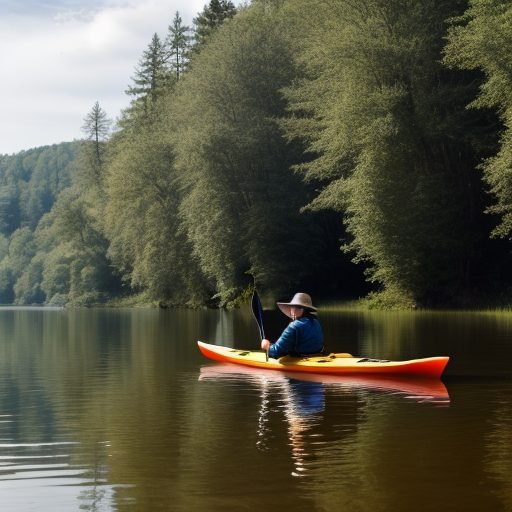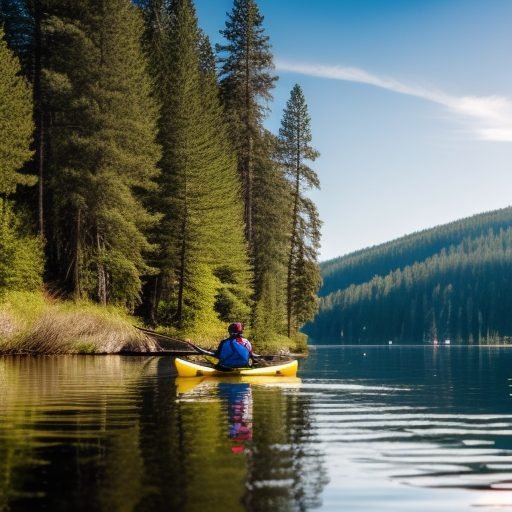==================
Florida Splendors is supported by our audience. When you purchase through one of our links, we may earn a small affiliate commission. As an Amazon Associate I earn from qualifying purchases. Your cost is not affected.
Picture this: a serene morning on a tranquil lake, the gentle lapping of water against your kayak, and the promise of adventure calling to you. If you’re new to kayaking, one of the first choices is to go for a sit-on-top or a sit-inside kayak. It’s a decision that could shape your paddling experiences and open doors to different waterborne worlds. In this article, we’ll dive into the world of sit-on-top vs. sit-inside kayaks, exploring their differences, advantages, and the best scenarios for each. So, whether you’re an adventurous beginner or a seasoned paddler looking to fine-tune your craft, let’s help you find the perfect kayak style for your next aquatic escapade.
Sit-On vs Sit-In Kayaks
“Sit-on-top or sit-inside kayak – which one’s right for you? It’s a question that’s on the minds of many when they dip their paddle into the world of kayaking. When you’re shopping for a kayak, this decision often floats to the surface as one of the first you’ll need to make. The truth is, whether you go for a sit-on-top or a sit-inside kayak is largely a matter of personal preference, though there are a few other things to keep in mind. So, in this article, we’re here to dive into the Sit-on vs. Sit-in kayak debate and help you navigate your way to the perfect choice. Let’s get started!”


Types of Kayaks
Kayaks come in two types. Sit-on-top (SOT) kayaks and Sit-Inside kayaks can be available in single and double configurations. They’re also available in rough shells and inflatables.
Sit-On-Top Kayaks
Sit-on-top kayaks lack an enclosed cockpit because the paddler is seated on top of the kayak above the water’s surface rather than below the water’s surface. Since the sit-on-top configuration does not make a paddler feel stuck inside the kayak, this kayak style is by far the most common design among beginning paddlers and kayak anglers.
The disadvantage of a sit-on kayak is that you will most likely get soaked when paddling and splashing since there is no sheltered space. If you don’t like getting wet, a recreational sit-in kayak with a larger cockpit opening may be a better option.
What's Inside
- Are Sit-On-Top Kayaks Safe To Use?
- 1. Distance Travel
- 2. Convenient
- 3. Storage Space
- 4. Great Control
- 5. Lightweight
- 6. Stability
- 7. Enclosed Cockpit
- 1. Not Good for Fishing
- 2. Tandem Options
- 3. Difficult to Capsizes
- 1. Ideal for Multiple People
- 2. Customization
- 3. Good for Fishing
- 4. Easy to Board
- 5. Paddles and Rudders
- 6. Self-Bailing
- 7. Open Cockpit
- 1. Lower Secondary Stability
- 2. Bad Storage Space
- 3. Difficult to Handle for Rough Seas
Are Sit-On-Top Kayaks Safe To Use?
It is a common query from newcomers. Sit-on kayaks are the best option if you want to be safe and easy to use. You should ensure that it would be simple to use if you get an inflatable or a sturdy sit-on yak. Everything you have to do is lie on it.
In reality, sit-inside kayaks would be more difficult for beginners since reentering the kayak after dropping out can be difficult. It complicates the option of a sit-in kayak, mainly if used at sea.

Sit-In Kayaks
As the name suggests, a sit-inside kayak has an enclosed cockpit. Therefore, rather than being on top of the kayak, the paddler is positioned below the water’s surface. As a result, this is by far the most common design among intermediate and experienced paddlers. The sit-inside design has a considerably lower Centre of gravity and, as a result, a much higher degree of secondary stability.
A sit-in kayak intends to protect your lower body from cold winds and waves, making it suitable for cold-water kayaking. However, there are some safety concerns.

Advantages and Disadvantages of Sit in Vs. Sit-on Kayaks
Following are the Pros and Cons of Sit-In and Sit-On Kayaks.
Sit-In Kayak Advantages
Sit-ins have many benefits that are beneficial for a variety of causes. But below are some of their most notable features:
1. Distance Travel
One of the main advantages is that it can travel a mile. If you’ve learned the art of paddling, you can rack up the miles due to how quickly these boats sail.
2. Convenient
A nimble sit-in kayak will turn on a dime, making it ideal for use in crowded bays and harbors.
3. Storage Space
The hulls of most sit-in touring kayaks have plenty of dry storage compartments.
4. Great Control
You’ll instantly feel stable and healthy until sitting in a sit-in yak. It takes a lot of effort to tip over or spill out. A sit-inside kayak’s enclosed cockpit allows the paddler to position their knees against the underside of the hull. It can significantly increase the paddler’s control of the kayak and its maneuverability.
5. Lightweight
The majority of modern sit-in yaks are constructed of blow-molded plastic, which makes them light enough for one person to move around and out of the water.
6. Stability
The most important advantage of a sit-inside kayak over a sit-on-top kayak is its lower Center of Gravity. As a consequence, secondary stability can significantly increase. It allows the paddler to lean the kayak on its side for more effective turning and to stay upright while paddling in rough seas.
7. Enclosed Cockpit
The paddler can protect from the sun and waves crashing over the bow or gunwale thanks to the sealed cockpit. A spray skirt can also be conveniently added to their integral cockpit to shield the paddler from the elements entirely.
Sit-In Kayak Disadvantages
Aside from all this, there are better vessels than sit-in kayaks for everyone. Here are three reasons why you should choose a sit-on-top yak instead:
1. Not Good for Fishing
The interior of a sit-on kayak restricts the range of motion needed for proper casting and reeling. Therefore, it is inconvenient to carry rods and trap boxes for Fishing.
2. Tandem Options
Although tandem sit-in kayaks are available, they have far fewer choices than tandem sit-on kayaks.
3. Difficult to Capsizes
Sit-inside kayaks are much more challenging to reenter if a paddler capsizes due to their enclosed cockpits. Even if a paddler capsizes, they must use a hand-operated or battery-operated bilge pump to remove the water from the cockpit.

Sit-On-Top Kayak Advantages
1. Ideal for Multiple People
Sit-on kayaks can carry hundreds of pounds of weight, with many being certified healthy for 500 pounds or more, making them ideal for tandem paddling.
2. Customization
With accessory brackets for fishing rods, GPS systems or sensors, rudders, and even engines, several fantastic sit-on kayaks can be customized to accommodate your wants and needs.
3. Good for Fishing
Sit-on kayaks give you much freedom of movement while throwing, trolling, and reeling. Many sit-on yaks are designed especially for anglers, with built-in rod holders that take care of much of the work for you.
4. Easy to Board
There is no cockpit to lower into in a sit-on-top kayak. Instead, you climb on, making mounting from a pier, beach, or pontoon boat much simpler and faster.
5. Paddles and Rudders
Many sit-on kayaks have foot-operated pedals and rudders. More speed, better stability, and a fantastic full-body exercise are advantages of having a rudder attached.
6. Self-Bailing
Scupper holes in sit-on-top kayaks cause water to drain off the deck. They make scupper plugs and valves to block the splashing through the scupper openings. However, they’re usually left exposed in colder weather.
7. Open Cockpit
The open cockpit is the most critical feature of a sit-on-top kayak. As a result, not only are sit-on-top kayaks much more accessible to reach and leave, but they still don’t make the paddler feel stuck in the cockpit if the kayak capsizes.
Sit-On Kayak Disadvantages
Let’s be honest with ourselves: while sit-on kayaks are a lot of fun in the water, they have some disadvantages.
1. Lower Secondary Stability
The biggest drawback of sit-on-top kayaks is that their Centre of gravity is much higher than sit-inside kayaks. As a result, sit-on-top kayaks have much larger beams than sit-inside kayaks to provide them with more excellent initial stability. They do, however, have a slightly lower degree of secondary stability as a result of this functionality.
2. Bad Storage Space
While an excellent sit-on kayak has at least one or two dry storage hatches, they’re usually a fraction of the size of the dry storage hatches used in a sit-in yacht.
3. Difficult to Handle for Rough Seas
Sit-on-top kayaks are difficult to lean on their sides due to their wide beam, open cockpit, and poor secondary stability. It makes them more challenging to navigate and makes edged turns almost impossible—moreover, they are much more vulnerable in rough seas than sit-inside kayaks.
Are Sit-In or Sit-On Kayaks Better: Find Which One Is Better
Sit-in kayaks are best for more experienced paddlers who plan to perform complex paddling techniques. There are several kinds of sit-in kayaks, but purpose-built kayaks are much more expensive than recreational kayaks. Overall, these are the kayaks for you if you want to pay more money and swim faster.
Sit-on-top kayaks are suitable for beginners or those who want to swim relaxed. Their reduced cost makes them far more accessible to those on a tight budget. They’re ideal for spending a day at the lake with friends or relatives. Because of their stability, they make excellent fishing platforms, so if you’re a recreational paddler or an extreme angler, these are the kayaks for you.
Video Credit: @HeadwatersKayak
Paddle Your Way to the Perfect Kayak: Sit-On vs. Sit-In Showdown
As we near the end of our journey through the world of sit-on-top and sit-inside kayaks, you’ve gained insights into the distinct advantages and disadvantages of these aquatic vessels. Remember, the ideal kayak for you isn’t just a matter of choice but a reflection of your waterborne aspirations.

If you’re a thrill-seeking adventurer, ready to embrace the spray and sun, the sit-on-top kayak might be your vessel of choice. Its freedom, ease of use, and versatility make it a great companion for casual outings and fishing adventures.
On the other hand, if you’re the type who craves precision, advanced maneuverability, and dreams of paddling along colder waters, a sit-inside kayak’s enclosed cockpit might be your perfect match.
Now, don’t let this newfound knowledge collect virtual dust. Take the plunge, choose your kayak, and embark on your next waterborne adventure! Explore the waves, conquer the currents, and make waves of your own. Whether you ride the waves atop a sit-on-top or nestle within the hull of a sit-inside, your next aquatic adventure awaits. Happy paddling!
Frequently Asked Questions
What are the key differences between sit-in and sit-on kayaks?
Sit-in kayaks have an enclosed cockpit where the paddler sits inside the kayak, while sit-on kayaks feature an open deck where the paddler sits on top. The choice between the two primarily depends on personal preference and intended use.
Are sit-on kayaks suitable for beginners, or should they opt for sit-in kayaks?
Sit-on kayaks are often recommended for beginners due to their ease of use and stability. You don’t feel confined, making them user-friendly for new paddlers. Sit-in kayaks can be more challenging, especially in reentry situations, so more experienced kayakers often prefer them
Discover More at Florida Splendors!
Explore the world of kayaking in Florida with us on our social media accounts:
- Facebook: Dive into our kayaking community, catch inspiring content, and stay updated with product reviews.
- Instagram: Immerse yourself in stunning visuals, trip highlights, and the beauty of Florida’s waterways.
- Pinterest: Find pinspiration for your next kayaking adventure with our boards filled with tips and ideas.
- Twitter: Stay in the loop with the latest updates, news, and kayaking trends.
Connect, engage, and share your passion for kayaking in the Sunshine State!



